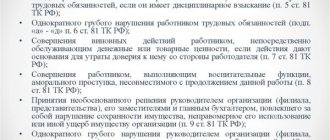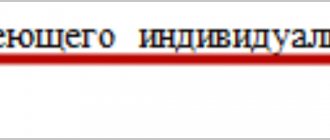Depth of meaning
So, if the word “crime” seems very serious and scary to us (largely thanks to F. M. Dostoevsky), then most often a misdemeanor is a minor violation, which can most often be attributed to negligence or a simple disregard for rules and regulations.
Thus, we can say that in the public mind these words differ only in the seriousness of the violation. Criminologists have their own opinion on this matter.
Actual difference
From the point of view of criminal logic, both a crime and a misdemeanor are a violation of the law - the difference is only in the degree of severity, so to speak. In the first case, we mean a more or less serious violation of the law and social norms. It is always followed by punishment in one form or another, be it imprisonment or a large fine.
It is not at all necessary to kill a person or rob a bank in order to commit a crime - financial fraud, for example, or an unsuccessful encounter in a dark alley is quite enough. In addition, from the point of view of the law, not only the direct commission of this or that act, but also the intention and involvement in it can be regarded as a crime from the point of view of the law.
A misdemeanor is an action that has much less danger to society. Punishments for them are much smaller, and sometimes even limited to issuing a warning.
What is the difference between a misdemeanor and a crime?
Crimes and misdemeanors, from the point of view of criminology, differ only in severity, but they are violations of the law.
Only after committing a crime does punishment always follow, which can be presented (depending on the severity) in the form of a real prison term and a large fine.
For many, a crime is when murder or harm to human health is committed. But in fact, even without killing anyone, you can commit a crime (an example is financial fraud).

People's misdeeds pose a much lesser danger to society, and therefore the punishment should not be so severe. Quite often they are limited to one warning.
Classification of offenses
Like most phenomena in our world, misconduct is an action that can be directed into different areas. It can be committed in relation to administrative norms or moral norms. This is what gives rise to the creation of a classification.
In the most general form, these violations can be divided into three categories: disciplinary offenses, administrative violations and, finally, civil offenses. From the names of these violations themselves, the division into just such types seems quite obvious.

There is an opinion that a misdemeanor is the first step towards a crime, so even minor violations can lead to quite serious consequences as a result of repetition or aggravation.
Let us now consider in more detail each type of violation of the law.
Types of offenses
We have considered what offenses are, but all of them can affect different areas of our lives and are committed in relation to, for example, administrative or civil norms. It is on this basis that the classification is built. The types of offenses are as follows:
- Disciplinary.
- Administrative.
- Civil misdemeanors.
- Immoral.
Most legal officials believe that any misdemeanor is the first step towards committing a crime, especially when the person has not suffered any punishment for committing it.
Let's look at the types of offenses in more detail.
The concept of disciplinary offenses and legal norms
The concept of a disciplinary offense and the procedure for holding an employee accountable for committing them are spelled out in the Labor Code in Art. 192. Also in this case, it is worth following Resolution No. 2 of the Plenum of the Supreme Court.
A disciplinary offense is an unlawful, guilty violation of labor or service discipline by an employee, for which disciplinary liability is provided. A disciplinary offense can be understood as an employee’s violation of the provisions of a job description, internal regulations or labor discipline.
In Art. 21, 189 of the Labor Code states the employee’s obligation to comply with these rules, and Art. 22, 191 provides for the employer’s right to reward an employee for the conscientious performance of his duties; Art. 22, 192, on the contrary, provides for punishment of employees if they fail to perform or perform improperly.
Also, on the issue of disciplinary offenses, it is necessary to take into account the provisions of Art. 81 of the Labor Code, which contains grounds for termination of an employment contract as a form of disciplinary action.
The possibility of simultaneously bringing an employee to disciplinary and financial liability is stipulated in Article 248 of the Labor Code of the Russian Federation. The duration of a disciplinary sanction is established in Art. 194 Labor Code of the Russian Federation. The maximum time limits given to the employer for penalties for committing a disciplinary offense by an employee are given in Art. 193 Labor Code of the Russian Federation.
The concept of disciplinary offense for certain categories of persons is specified in special laws. So, for example, according to Art. 28.3 Federal Law-76 “On the status of military personnel” it is not allowed to classify actions under orders and in necessary defense as misdemeanors.
Also, the internal regulations of the enterprise can be devoted to the definition and classification of offenses and the procedure for imposing penalties.
Types of labor disciplinary offense:
a) failure to conscientiously fulfill the duties of an employee or employer provided for in an employment contract; b) failure to comply with the internal labor regulations of the organization; c) failure to comply with labor discipline; d) failure to comply with established labor standards; e) failure to comply with labor protection and occupational safety requirements; f) lack of care for the property of the employer and other employees; g) failure of the employee to inform the employer or immediate supervisor about the occurrence of a situation that poses a threat to the life and health of people, the safety of the employer’s property
What is the definition of a disciplinary offense?
Article 192 of the Labor Code of the Russian Federation defines a disciplinary offense as failure to fulfill or incomplete, poor-quality performance of labor duties assigned to a citizen. Analysis of labor legislation allows us to identify the main features of a disciplinary offense:
- An illegal action is being committed that violates official or labor discipline.
- The employee's actions are his fault.
- Unlawful and guilty actions are subject to disciplinary liability.
In this case, the employee’s job responsibilities can be specified:
- labor legislation;
- local acts establishing internal labor regulations;
- instructions (job descriptions).
A disciplinary offense is always associated with the existence of an employment contract, which must stipulate the responsibilities of a working citizen. If his actions do not affect the provisions of the employment contract, such an offense can be excluded from disciplinary action. An employee who has received an order from management that violates the law has the right to refuse to carry it out. This is also not a disciplinary violation of labor relations.
If the employee did not fulfill the duties assigned to him, but his guilt was not established during the proceedings, it means that he did not commit a disciplinary offense.
There is no list of disciplinary offenses, as mentioned above. However, it is possible to identify certain types of such offenses and assess their severity. When imposing a disciplinary sanction, this criterion must be taken into account.
Types of disciplinary offenses
It is most important to determine whether there has been misconduct:
- intentional;
- without intent.
Example: an employee violated the order of technological actions in order to obtain the final result as quickly as possible and caused a defect. Another example: an employee committed the same violation with the same result intentionally, for personal reasons. It is clear that in the second case the punishment will be more severe.
In addition, the following offenses are distinguished:
- any employee who has entered into an employment contract;
- worker in a special field.
Certain categories of workers may commit offenses that have more severe and dangerous consequences. Their responsibility is regulated by special industry documents on labor, highly specialized federal legislative norms (transport workers, civil servants, nuclear workers, etc.).
Disciplinary offenses as grounds for dismissal at the initiative of the employer are mentioned in Art. 81 of the Labor Code of the Russian Federation, but the list of them is not limited to this article.
Misdemeanors of a disciplinary nature most often include:
- ignoring the orders of the manager or their negligent execution;
- ignoring production technologies and job descriptions;
- being late for work;
- absenteeism;
- drunkenness at work;
- refusal to undergo a medical examination if it is mandatory;
- damage to company property;
- theft, misappropriation of property.
How is a disciplinary offense determined?
- What are valid reasons for absenteeism?
If the work does not suit the employer, before imposing a punishment, the employer must consider whether the following signs of disciplinary offense are visible:
- Absence from the workplace during the period of time specified in the employment contract without good reason (sick leave, vacation, business trip).
- Refusal to perform work in accordance with new standards established by the administration with prior notification to the person.
- Refusal of a medical examination, training in working with enterprise equipment, testing of technical safety knowledge, and other mandatory procedures.
- Failure to sign an agreement on financial liability if the nature of the work requires this.
- Refusal to follow management orders.
If these signs are seen in a person’s actions (or inaction), the employer has the right to apply penalties, depending on the offenses committed.
Responsibility
An employee who has violated legal norms or labor discipline rules may be subject to various types of liability depending on the severity of the offense. Thus, an employee can be brought to criminal liability only by a court decision, and to administrative liability - by order of supervisory authorities vested with the appropriate powers. Bringing an employee to disciplinary liability is within the competence of the employer.
Responsibility for disciplinary offenses comes in the form of disciplinary sanctions . According to Art. 192 of the Labor Code, three types of disciplinary sanctions are possible: reprimand, reprimand or dismissal.
Certain categories of employees face other types of such disciplinary action. For example, civil servants or police officers may be severely reprimanded under Art. 57 FZ-79 of 2004 or Art. 41.7 Federal Law No. 2201-1 of 1992. For prosecutors and customs officials, disciplinary offenses are fraught with a warning about incomplete official compliance under Art. 50 FZ-342 or clause 32 of FCS Order 31658 of 2008.
It is worth emphasizing that the Labor Code does not allow the use of forms of disciplinary sanctions that are not provided for by federal laws, charters and regulations on discipline under Part 4 of Art. 192 TK. Therefore, imposing fines on employees for disciplinary offenses is contrary to the law.
At the same time, an employee who has committed a disciplinary offense may be legally deprived of bonuses and other incentive payments. Or their size is subject to reduction if this is stipulated in the local regulations of the employer.
The employer himself has the right to decide what punishment to apply to the employee for the offense he has committed. Moreover, it must be commensurate with its gravity, the circumstances of its commission under Part 5 of Art. 192 of the Labor Code and the employee’s previous behavior, his attitude towards the performance of work duties.
The most common measure of liability is a reprimand.
Dismissal is the most severe form of punishment and is used in cases of gross violation of labor duties. In clause 6, part 1, art. 81 of the Labor Code states when it is permissible to dismiss an employee, even if he has committed an offense once. This list includes:
- Absenteeism.
- Showing up at work under the influence of alcohol or drugs.
- Disclosure of state, official or commercial secrets , including through disclosure of personal data.
It is also possible to dismiss an employee if he has repeatedly failed to fulfill his job duties, and provided that a disciplinary sanction has been applied to him during the last year and at the time of the repeated offense it has not been removed or extinguished. It does not matter what form the first penalty took: a reprimand or a reprimand.
It is also not necessary that we are talking about the same misconduct: for example, only about the employee being late or exclusively about poor quality work. Violations can be different.
Administrative offenses
One of the most common types of violation of the law. An administrative offense is equally about ticketless travel and violations of rules and norms of behavior in public places.
In this category, the range of possible options is greatest. In fact, any administrative offense is an attack on the order established at the legislative level or the results of the relationship between the executive and administrative powers.
Thus, careless driving or failure to comply with fire safety rules and sanitary standards fall into the category of offenses of this kind. For violations of this nature, a person is not brought to criminal liability, but to administrative liability (fines, confiscations or correctional labor).
Types of administrative offenses:
1) illegal acts that infringe on the rights of citizens;

Types of civil offenses:
Civil offenses are unlawful acts of subjects that cause harm to property and related personal non-property relations regulated by civil law (failure to fulfill or improper performance of contractual obligations, causing property damage. (Prof. A.S. Shaburov)
a) violation of the requirements of civil legislation; b) violation of the terms of the contract; c) non-fulfillment or improper fulfillment of an obligation (Articles 393, 397, 401 of the Civil Code of the Russian Federation); d) use of other people's funds as a result of their unlawful retention, evasion of their return, other delay in their payment, or unjust receipt or savings at the expense of another person (Article 395 of the Civil Code of the Russian Federation); e) causing property or personal non-property harm to an individual.
Category of civil violations
Perhaps, offenses of this kind can be called one of the least dangerous for society as a whole. This category may include, for example, violations of copyright or the terms of other documentation.
Civil misconduct is mostly failure to comply with any obligations, but this category also includes actions that affect the honor and dignity of another citizen (for example, spreading false rumors and information that is offensive). This also includes actions that discredit something of spiritual value to another person. Thus, one of the rather high-profile cases of this kind can be called the scandal surrounding the female musical group Pussy Riot, who once staged a real show right in an Orthodox church.

The term “immoral” is often applied to violations of this kind. From a legal point of view, this use of the concept is incorrect. An immoral offense is the commission of an intentional act of violence against another person. In this case, there are certain features that will be discussed below.
What is a disciplinary offense
By disciplinary offense, the legislator means failure to perform or improper performance of labor functions assigned to an employee. This concept should be considered somewhat more broadly. Keep in mind that during the course of their work, an employee is required to adhere to many different laws, regulations, orders, rules, instructions, regulations. All of them are included in the concept of labor discipline.
The employer is required to give full consideration to each potential violation. Determine its nature, grounds, prerequisites. Obtain information from all participants (stakeholders) of the labor process that was violated.
But here you should remember this nuance. An employer can hold an employee accountable for a violation only if the violation was committed through his direct fault. It is worth dwelling on the following points:
- the employee’s guilt must be proven;
- guilty actions must have any consequences, or create real grounds for such consequences in the future;
- if the offense was committed simultaneously by several employees, the guilt of each of them must be determined individually;
- consideration of the offense must be comprehensive;
- it is necessary to take into account the influence of external factors due to which the violation arose, and which the worker did not have the opportunity to influence.
Remember, in each specific case, the definition of a disciplinary offense will be individual. Even if the guilt of the violator is obvious, the review procedure provided for by legislators must be completed in full.
Immoral misconduct
Already in the name of this type of violation, the basis for identifying this category as separate is clearly visible. In this case, we are talking specifically about violating moral norms, and not civil norms in general.
According to the current labor code, misconduct of this kind serves as sufficient grounds for dismissing a person from his position. In this case, a corresponding entry is made in the work book, which subsequently leads to serious difficulties in attempts to find employment.
Immoral acts most often include, for example, committing violent acts for educational purposes or demonstrative humiliation of a person. Most often, sadly, such violations of the law are committed by employees of schools, kindergartens and other educational institutions.

The difficulty in defining and punishing this type of offense is that the decision depends on beliefs and one’s own criteria for assessing normativity. So, what for one person can be regarded as violent actions, for another it turns out to be simply a lack of upbringing.
Immoral offenses
These types of offenses are often classified as civil, but it should be noted that immoral actions are most often intentional and involve violent actions towards another person.
If we consider such offenses, we can see that it is not civil rights that are being violated, but moral norms. Examples include:
- Committing violent acts for educational purposes.
- Humiliation of human dignity.
- Assault towards one's students.
- Public insult.
- In some cases, demanding bribes from students during the session is also considered an immoral offense.
- Appearing drunk in public places.
- Involvement of minor children in the process of drinking alcoholic beverages.

Quite often, the participants in such proceedings are employees of educational institutions, teachers and educators. If it is proven that such an offense has been committed, then this is a valid reason for dismissing the employee from his position. In this case, a corresponding entry must be made in the work book, which in the future can lead to certain difficulties in finding a new place of work.
If an immoral offense is committed by a person who has nothing to do with the process of raising children, then dismissal may not follow, but other penalties are applied.
Immoral offenses are considered the most difficult in terms of proceedings and punishment. Since the final decision on whether to classify an offense as immoral or whether it is evidence of a disgusting upbringing will depend on the personal moral qualities of the one who is involved in the proceedings of this case.
The imposition of any penalty for committing an immoral offense must occur no later than a month from the date of its discovery and no later than six months from the moment it was committed.
Disciplinary violations
We come across such a concept as discipline almost every day. It is understood differently, depending on the situation, but if we talk about the main, most direct meaning, discipline is compliance with certain rules and norms, fulfillment of duties.
Most often, a disciplinary offense is a violation of the terms of the employment contract in general and the discipline prescribed therein in particular. In this case, equally serious consequences can include both a dishonest attitude towards one’s duties and complete disregard for them.
From the above it can be understood that, in contrast to civil law, a disciplinary offense is a violation in the field of labor discipline. The decision to impose punishment in such cases is made by the administration of the enterprise, and not by law enforcement agencies.
Let us note that official misconduct is also a violation of labor discipline, so in some cases actions of this kind are not even classified as a separate category.

The simplest example of a disciplinary offense can be called, for example, lateness, negligence leading to minor consequences, or minor abuse of authority.
Classification by types of penalties
Administrative responsibility
is based on the elements of an administrative offense (offence). The main source of norms of administrative law, the sanctions of which provide for measures of state influence applied to persons guilty of committing administrative offenses, is the RSFSR Code of Administrative Offenses. Types of administrative penalties include: warning, fine, compensatory seizure or confiscation of certain items, temporary deprivation of a certain right, such as driving a car, and other measures. The peculiarity of administrative liability is that it is imposed by officials to whom the offender is not subordinate (for example, a driver who has violated traffic rules is fined by a traffic police inspector).
Civil liability
occurs for violations of obligations arising from the contract, as well as for causing property non-contractual damage. This type of liability is often expressed in the application of so-called legal restoration sanctions, providing for compensation for property damage caused, for example, caused by a source of increased danger, and in this case, as an exception to the general rule, liability occurs even in the absence of fault of the owner of this source (for example, a car). The law also provides for such a measure as the restoration of a violated right, as well as the possibility of collecting a penalty in the form of a fine or penalty from the person guilty of violating contractual obligations (for example, in case of failure to pay rent on time).
Disciplinary responsibility
applied for committing a disciplinary offense. Unlike administrative liability, it is imposed by an official to whom the offender is subordinate in service. Disciplinary measures include reprimand, reprimand, severe reprimand, temporary transfer to a lower-paid job and some others.
The financial responsibility of workers and employees is distinguished as a special type
which applies if they caused damage to an enterprise, organization, or institution in the performance of their work duties.
Administrative offenses
One of the most common types of violation of the law. An administrative offense is equally about ticketless travel and violations of rules and norms of behavior in public places.
In this category, the range of possible options is greatest. In fact, any administrative offense is an attack on the order established at the legislative level or the results of the relationship between the executive and administrative powers.
Thus, careless driving or failure to comply with fire safety rules and sanitary standards fall into the category of offenses of this kind. For violations of this nature, a person is not brought to criminal liability, but to administrative liability (fines, confiscations or correctional labor).
Classification by branches of law.
Administrative offenses (misdemeanors)
– these are attacks on state or public order, property, rights and legitimate interests of citizens provided for by the norms of administrative, financial, and land law. Examples include petty hooliganism and ticketless travel on public transport.
Civil violations (misdemeanors) –
These are encroachments on property and related personal non-property relations, which are regulated by civil law, as well as some norms of labor, family, and land law. Examples include failure to pay a debt within the period established by the loan agreement, delivery of substandard products under a supply agreement, dissemination of information discrediting the honor and dignity of another person.
Disciplinary offenses (misdemeanors)
– these are encroachments on the internal regulations of institutions, enterprises and other organizations. They represent violations of internal labor regulations (for example, absenteeism, being late for work), military discipline regulations (unauthorized absence of a military personnel), academic discipline (missing classes without a good reason), etc.
Criminal offenses
The problem of misconduct of this kind has been discussed in the legal community for more than 25 years. However, it has not yet been possible to come to a clear conclusion regarding this. A criminal misdemeanor is essentially an offense that does not fall under the category of criminal. Basically, this type of violation includes crimes that, when committed, do not pose a great public danger.

That is why, despite the rather intimidating name of the category, offenders in such cases are not brought to criminal liability. The maximum penalty in this case is not full imprisonment, but temporary arrest. The maximum detention of the offender may be extended to six months and no more.
Types of offenses
Disciplinary offenses committed by employees in the course of their work activities differ in severity, as well as their consequences (see Table 1).
Table 1. Groups of disciplinary offenses
| View | Description |
| Minor offenses | Usually they are associated with the need to maintain proper order and discipline in the enterprise. Such offenses include cultural behavior (violation of the company’s communication codes), timely arrival and departure from work. In fact, they do not cause any harm to the enterprise. |
| Misdemeanors of moderate gravity | In this case, we are talking about violation of technological instructions, rules, due to which various negative consequences occur or are created. Usually they can already be calculated in monetary terms. As an example, this is a stoppage of equipment operation, disruption of product delivery, a decline in the company’s image due to incorrect actions of employees in the process of customer service |
| Gross misconduct | This category includes violations that have specific financial losses. Damage to equipment, deliberately unlawful actions due to which the company suffered financial losses, creation of emergency situations with consequences. Or without them. |
| Crimes | This category includes actions for which liability is provided for by the criminal code. They are being investigated by competent law enforcement agencies. Notifying them is the responsibility of the administration. Otherwise, she becomes an accomplice in the crime. |
Remember, the appropriate punishment will be selected depending on the severity of the offense. Keep in mind that if there is a systematic repetition of even minor offenses, the employee can be fired for this.
The question of category stability
As can be seen from the above, the boundaries between types of offenses are quite blurred. For example, a proposal has long been developed to transfer about 65 types of offenses from the category of administrative to criminal. There are constant debates and discussions on this topic.
Only one thing is obvious: the misdemeanor is much less serious than the crime, and, accordingly, the penalties are much less severe. The boundary between these concepts, however, is quite fluid, and a crime is often separated from a misdemeanor by just one detail. For example, serious speeding by the driver of a vehicle is undoubtedly a misdemeanor.

However, if at the same time he unintentionally hit a pedestrian, this is already a crime requiring completely different penalties.








